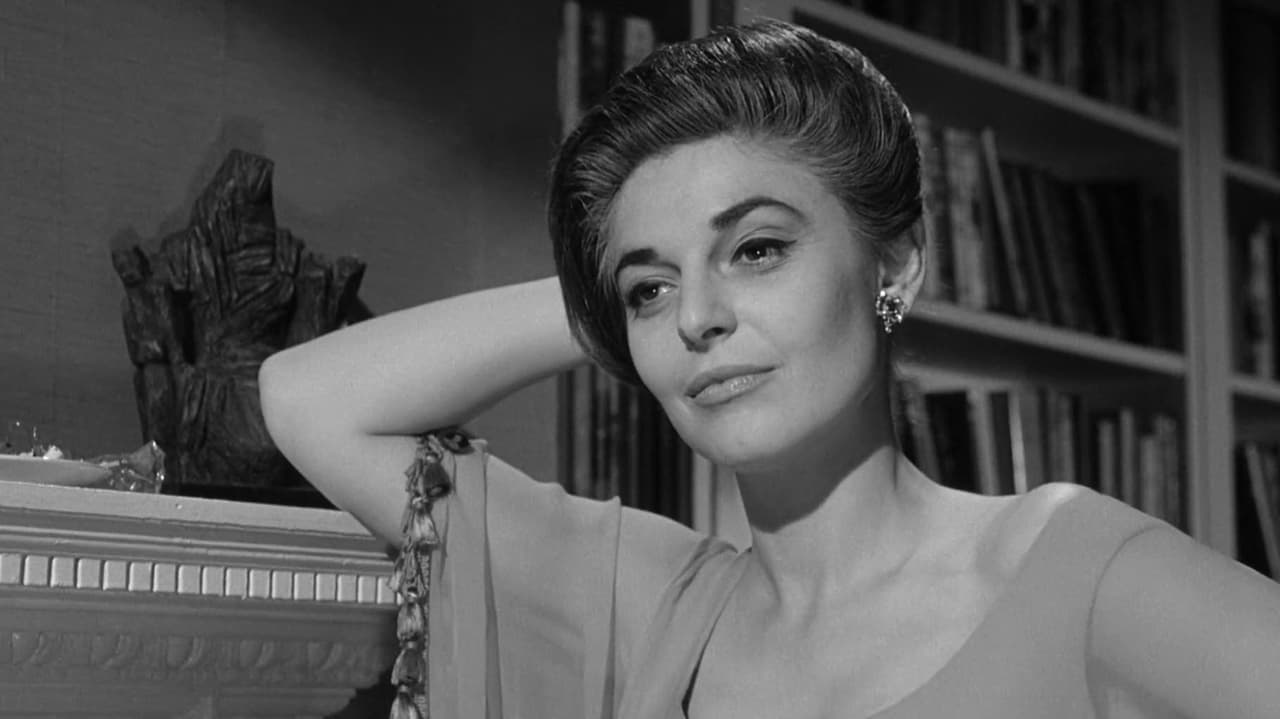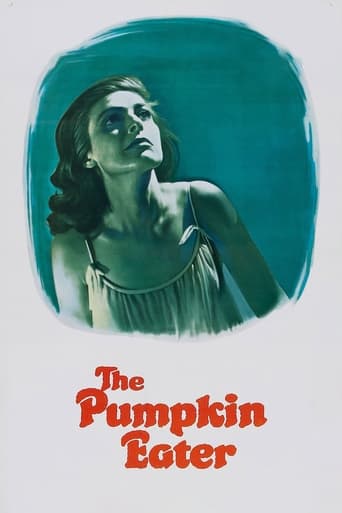Stometer
Save your money for something good and enjoyable
ScoobyWell
Great visuals, story delivers no surprises
CommentsXp
Best movie ever!
SeeQuant
Blending excellent reporting and strong storytelling, this is a disturbing film truly stranger than fiction
HotToastyRag
I owe this movie a disclaimer before giving it a scathing review: I turned it off. I didn't see The Pumpkin Eater all the way through, so I have no idea if the second half or the end redeems the terrible beginning. Anne Bancroft was nominated for Best Actress at the Oscars for her role as a depressed, repressed housewife in this dark, slow, drama. She's married to Peter Finch, and while he continually cheats on her, she's in therapy to try and figure out why she's so unhappy. By the time I turned it off, she'd started discussing her aversion to sex and her unfulfillment in her marriage. I only saw one expression on Anne's face, as if she'd just gotten a shot of Botox in her forehead, and since I'd expected more from this critically-acclaimed performance, I turned it off. Despite the supporting cast of James Mason, Maggie Smith, Cedric Hardwicke, and Janine Gray, I wasn't even remotely tempted to keep watching. As a side note, I also turned off The Happy Ending, a film starring Jean Simmons who tries to figure out why she's chronically unhappy in her marriage. These types of movies are not my favorite. If you like them, feel free to disregard my opinion.
kijii
The Pumpkin Eater, for which Ann Bancroft won a Golden Globe and received her second Best Actress Oscar nomination, is an example of how she could dramatically dominate a film. This film, based on Penelope Mortimer's novel, is energized by Harold Pinter's enigmatic screenplay, beautifully photographed by Oswald Morris, and expertly directed by Jack Clayton. Peter Finch, James Mason, and Maggie Smith, round out a great cast. As the film opens we see a well-dressed, but extremely depressed woman, Jo Armitage (Ann Bancroft), entering her house. She seems totally alone. Her isolation is apparent as she lets a telephone ring without answering it. As she looks out from her lofty tower (an old Dutch-style windmill, without its blade-like arms, that had been restored as part of her house), we see a split screen (double exposure) showing us her thoughts from the time when she first met her husband, Jake (Peter Finch). This split screen cues us into a flashback that will make up the bulk of the film. I love this shot because it simulanteouly shows us Jo's present- day depression (shown on our left side) and blends it with images of the formerly happy and laughing Jo (shown on our right side). Not only is there chiaroscuro in the image but there is also chiaroscuro when one compares Jo's present mood with that of her past.As we enter the flashback, we see Jo living in a restored barn with her second husband, Giles (Richard Johnson), and her seven children. There, she meets one of Giles' friends, Jake Armitage (Peter Finch). She eventually leaves Giles for Jake. He marries her in spite of her brood of children, accepting both the 'zoo and the zookeeper' as her father, Cedric Hardwicke, puts it. Jo's father wants to give Jake a 'fighting chance' of succeeding, so he offers to pay for having the two eldest sons shipped off to boarding school and putting a deposit down on a modest London flat for Jake and his ready-made family. As Jo becomes pregnant with Jake's child, he goes on to become a successful and wealthy film writer. Since his work takes up much of his time, Jo becomes empty and unhappy. Jake asks one of his co-workers, Philpott (Maggie Smith), to live with them for a while and help Jo in caring for the children. But, Philpott is not much help, and Jo doesn't understand why she is staying with them. After Jo accuses Jake of having an affair with Philpott, Philpott leaves them. Also, Jo doesn't feel comfortable with Jake's film-related crowd and stays home with the children rather than accompanying him to filming locations or going to the required social parties. Jo wants Jake to herself, but that isn't possible with his work; Jake 'n Jo continue to co-exist in quiet desperation. One day while shopping at Harrod's, Jo publicly breaks down. Jake has Jo start psychotherapy and she eventually becomes better. The sessions with her psychiatrist, Eric Porter, are revealing, but not overstated in this Pinter screenplay. One evening, Jo decides to invite Jake's working friends to a party. However, she feels alone, isolated, among her own guests. One obnoxious guest at the party is Bob Conway (James Mason). Conway--who declares his distrust of 'professionals' and prefers to be called a 'craftsman'--is married to a film actress, Beth (Janine Gray). The social (professional) link between Beth and Jake is Jake's film writing. When Jo becomes pregnant again, Jake asks her to have an abortion and sterilization. (He wants to someday be free to travel, have fun, and not always be thinking about caring for another new child—to be able to start out all over again). He has Jo's doctors approve the medical procedures based on her psychological and medical condition. Jo learns to live with this until she finds out, from Bob Conway, that HIS wife is pregnant, but not by him—by Jake.Aside from the great acting, directing and photography, I think that this is a very good film in that it is often able to show emotions WITHOUT the use of words. It is not always easy to show what depression actually 'looks like, 'but this film captures it quite well. It also captures isolation, manipulation, and panic in a way that I have never seen done so well before. Priceless!
MarieGabrielle
While Anne Bancroft is very believable in this somewhat dark and angst- ridden drama, its a bit hard to relate.The story basically encompasses unhappy marriage, a cheating husband, the balm of family and children, and how all this affects a beautiful but bored London housewife.The James Mason character is very good, as a meddlesome and disturbed friend, also unhappily married to a faithless wife (well-portrayed, the role of Philpot, Maggie Smith).When he takes Bancroft on a trip with the children to the local zoo, his self-hatred and rage is projected onto Bancroft as she is informed that her husband (a deranged and manic Peter Finch) has impregnated Philpot, wants to have the child, and convinced Bancroft to abort her child. The betrayal, pettiness, heartbreak and demise of marriage is well depicted.That being said, while the performances are excellent this is a rather depressing film for anyone who may have been through this (in a less melodramatic form of course). Overall, it may be due for a milder remake, which does not place its characters on the verge of suicide to make its point. I enjoyed Bancroft but the story itself, and the fact that she is a character who simply keeps procreating to feel a purpose, is too abysmal and sad to make the premise believable.
whpratt1
Always enjoy all the films that Anne Bancroft appears in and I consider this one of her best films where she plays the role as Jo Armitage who bounces around with husbands and can't seem to find the right guy. Jo is married to husband number two and she meets up with a writer named Jake Armitage, ( Peter Finch ) and marries him. Joe also has five children. Things go along very well in their new home in the country until Jo becomes pregnant and Jake does not want her to have this child so she goes ahead and aborts. Jo becomes depressed and has a mental breakdown and their marriage takes various changes. There are plenty of flashbacks that recall various scenes from Jo's past. This film is rather depressing at times which shows the realism of a family as you watch like a fly on the walls of the home. If you have been in love and become heart broken you will be able to relate to this films. James Mason, (Bob Conway) gives a great supporting role along with many other famous actors. Enjoy

